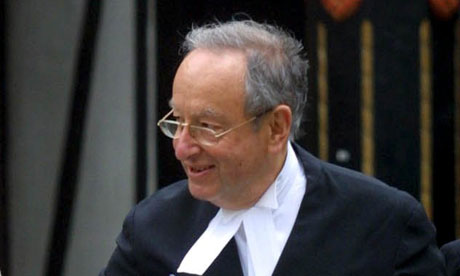Parliament's joint committee on human rights (JCHR) has produced a unanimous report on the government's justice and security green paper that is as precise and persuasive as the green paper itself is unfocussed and unconvincing.
The JCHR has narrowed down the government's objectives to those it regards as necessary for the protection of national security and come up with a proportionate way of meeting them.
It has also identified a "serious omission" from the discussion document launched by the government last October - the impact of its proposals on the freedom of the media to report on matters of public interest and concern. "The role of the media in holding the government to account and upholding the rule of law is a vital aspect of the principle of open justice," the JCHR says.
That principle was reflected in yesterday's victory for the Guardian in the Court of Appeal, delivered after the JCHR report was completed. In allowing reporters access to documents referred to in court unless there are reasons not to, Lord Justice Toulson said that "open justice lets in the light and allows the public to scrutinise the workings of the law, for better or for worse".
And here I must declare an interest. I gave oral evidence to the JCHR alongside Ian Cobain, one of the Guardian's investigative reporters. So, too, did Jan Clements, one of the Guardian's in-house lawyers. Our evidence is reflected in the committee's recommendation that the principle of open justice should be taken into account in deciding whether or not evidence should attract what is known as public interest immunity (PII).
This takes us to the heart of the committee's disagreement with the government. The green paper proposes to extend the availability of so-called closed material procedures (CMP) in all civil cases to any evidence whose disclosure might harm the public interest. But the JCHR is not persuaded that there is a strong enough case to justify abandoning the existing PII system.
That system was developed by the courts to deal with the problem of evidence that may be too sensitive for one side in litigation to disclose in the normal way to the other. A judge looks at the material and conducts a balancing exercise, weighing up the public interest in non-disclosure against the public interest in open justice. If the former outweighs the latter, neither side can rely on the excluded evidence and the judge makes no use of it.
By contrast, there is no balancing exercise in a CMP. One party - effectively, the government - decides that evidence is too sensitive to be disclosed to the other side. If the court agrees that disclosure would harm the public interest, the judge can rely on the "closed" evidence while the non-government party can not. That party's interests are represented by a "special advocate", a lawyer who is not allowed to tell him what the evidence says.
In some circumstances, the special advocate may be able to give the party whose interests he represents a gist of the evidence, allowing that party to give effective instructions to the special advocate (such as "I was abroad that week"). Under the government's proposals, even that safeguard would not apply in certain categories of case. The JCHR rightly recommends judges should always conduct a balancing exercise, even with CMPs, and that the government should always have to disclose sufficient evidence in CMPs to allow effective instructions to be given to the special advocate.
Ultimately, CMPs are unfair. And they are not even welcomed by the judges, at least as far as the JCHR was able to find out. As Lord Kerr famously said in the supreme court, "evidence which has been insulated from challenge may positively mislead."
As the JCHR recognises, the green paper was designed to reassure the Americans that their intelligence would not be shared against the British government's wishes. But an absolute ban would be against the rule of law, and it's something that not even the US intelligence services can guarantee. The JCHR's measured, proportionate solution is to increase certainty in the kind of cases that caused the US government such concern. The so-called Norwich Pharmacal jurisdiction, which applies where one party becomes "mixed up" in the wrongdoing of another, should be put onto a statutory footing as the government itself had proposed.
Persuasive though the committee's conclusions are, the government is under no obligation to take account of them. But it has already got the government on the run.
First, the committee complained that the government was not publishing responses to its own green paper as they were received, contrary to normal practice. The justice secretary, Ken Clarke, prevaricated, saying he'd have to ask each of nearly 100 people who'd replied whether they minded. Eventually, he did so and all but six of the 90 responses were published.
Next, the JCHR persuaded the government to narrow the scope of its proposals. Cynics might say that the security and intelligence services had initially asked for much broader powers than they needed in order to concede gracefully. I doubt it. Listening to Clarke, he seemed to think that the green paper he'd signed off dealt only with material whose disclosure would harm national security.
It was not, but the JCHR was right to recognise that Clarke's oral evidence reflected a change of position - and one it now seeks to hold the government to.
The committee also took a properly sceptical approach to late evidence from David Anderson QC, the independent reviewer of terrorism legislation, on cases that could not be decided without the use of CMPs. Such questions should be decided by judges, it said, using PII procedures.
The JCHR was also right to resist the introduction of CMPs into inquests. Only one inquest has been delayed because it involved intercept evidence, the disclosure of which ministers still refuse to permit. But, I learn from the JCHR report, the Azelle Rodney inquest is to go ahead in September as a public inquiry. So there's a way round that problem too.
The JCHR has only two high-powered lawyer/politicians among its members: Lord Lester QC and Dominic Raab MP. How, then, has it produced such a clear, well-argued, forensic dissection of an ill-considered, vague and confusing green paper?
The answer, of course, is the committee's officials; and, above all its long-serving legal adviser. If anyone deserves the credit for trying to preserve the rule of law against the government's superficially attractive but deeply damaging proposals, it is Murray Hunt.



You need to be a member of Parents Against Injustice to add comments!
Join Parents Against Injustice